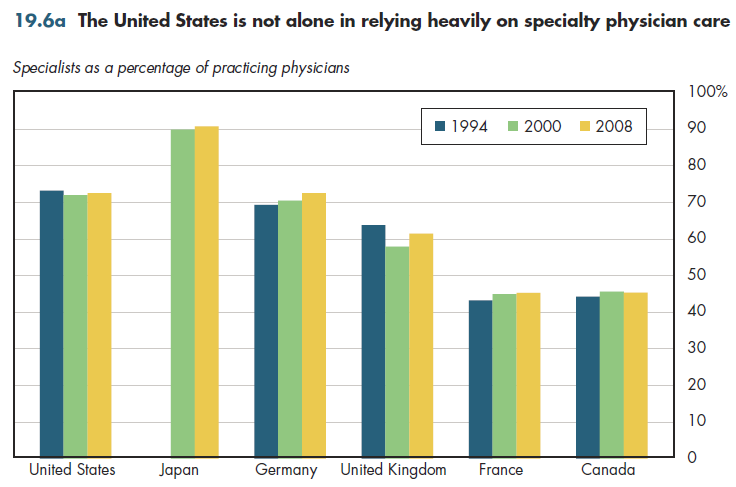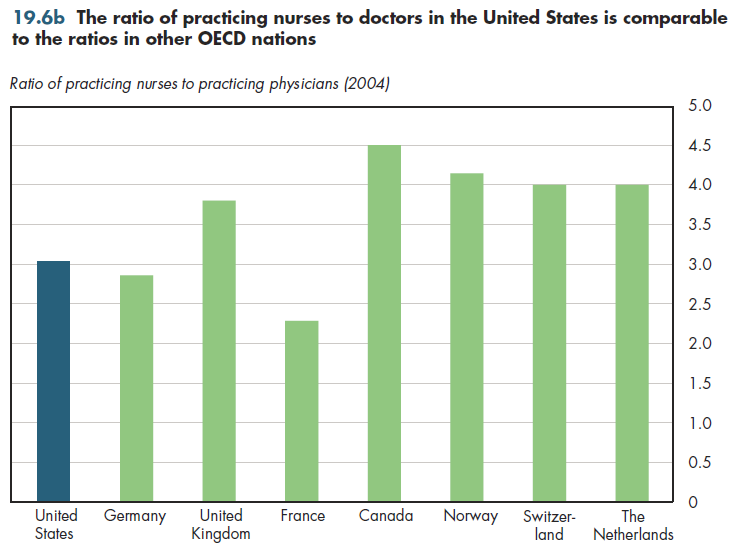Download PowerPoint versions of both figures.
Inside Collection (Book): American Health Economy Illustrated
19.6 US Relies Heavily on Specialists in Contrast to Primary Care Doctors
Summary: Compared with some major competitors, the United States relies more on specialists than on primary care doctors.
In the United States, seven in 10 physicians are specialists (figure 19.6a). This is higher than in France or Canada, where fewer than half of practicing doctors are specialists. However, by this same metric, U.S. reliance on specialists is only somewhat higher than in the UK, the same as in Germany, and is lower than in Japan.

In most countries, the specialty share has been increasing since 1994. In the United States, the specialty share is down slightly from its 1994 level. However, in the most recent residency match, fewer than 20 percent of medical residencies were in primary care, suggesting that absent some major change in policy, the specialty share is likely to increase in the future.
The ratio of nurses to physicians in the United States is approximately in the middle of the remaining OECD countries for which such data are available (figure 19.6b). However, Canada's ratio is 50 percent higher than in the United States and in countries most comparable to the United States in terms of health spending per capita (the Netherlands, Norway, and Switzerland), the ratio is approximately 30 percent more. No strong inferences can be made about either efficiency or quality from these comparisons, but they illustrate how differently industrialized nations organize and deliver medical care.

The new health reform law has several provisions designed to expand the supply of primary care providers. The law included (starting in 2011) a 10 percent bonus for five years under the Medicare fee schedule, to family doctors, internists, geriatricians, nurse practitioners, and physician assistants who provide 60 percent of services in qualifying evaluation and management codes. The law also requires states to increase Medicaid payment rates to Medicare levels in 2013 and 2014 for providers who deliver certain primary care services. These measures might encourage more medical students to enter these fields and also might delay the retirement of those thinking about quitting their practices.
If implemented, the new health reform law will increase demand for primary care. How much of that ultimately is provided through physicians as opposed to less expensive mid-level providers (for example, physician assistants or nurse practitioners) remains to be seen.
Downloads
References
- Organisation for Economic Co-operation and Development.
Collection Navigation
- « Previous module in collection 19.5 Increased US Health Spending Cannot Be Explained by Health Services Use
- Collection home: American Health Economy Illustrated
- Next module in collection » 19.7 Americans Pay Higher Prices for Brand-Name Drugs among Major Industrialized Countries
Content actions
Give feedback:
Download:
Add:
Reuse / Edit:
Twin Cities Campus:
- © 2012 Regents of the University of Minnesota. All rights reserved.
- The University of Minnesota is an equal opportunity educator and employer. Privacy
- Last modified on Sep 24, 2013 3:34 pm -0500









